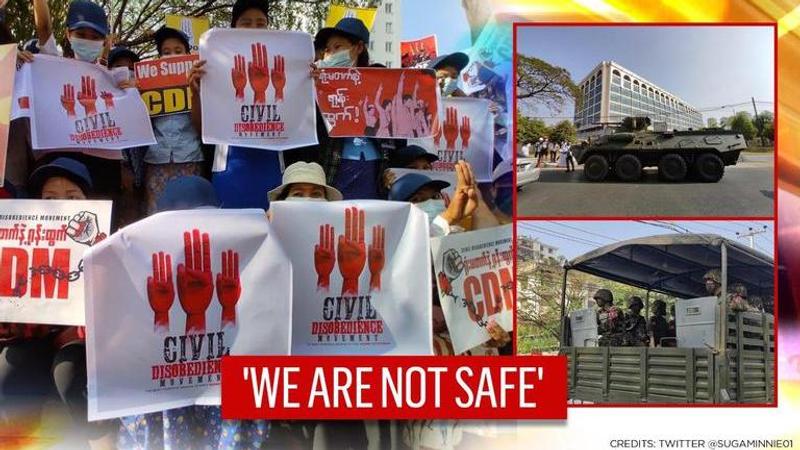Published 12:35 IST, February 15th 2021
Myanmar junta cuts internet connectivity, deploys 'tanks and armoured convoys' in city
Myanmar's junta on Sunday cut internet connectivity across the country hours after it deployed tanks on the roads of three cities - Yangon, Myitkyina, & Sittwe.

Myanmar's junta on Sunday cut internet connectivity across the country hours after it deployed tanks on the roads of three cities - Yangon, Myitkyina, and Sittwe. This was the first time the military chose to rollout armoured vehicles since the February 1 coup, triggering fears that protesters could be dealt with a hard hand. The US embassy in Burma warned its citizens to refrain from going outside, adding "there are indications of military movements in Yangon and the possibility of telecommunications interruptions".
"The U.S. Embassy recommends all U.S. citizens shelter-in-place during the 8:00 p.m. to 4:00 a.m. curfew hours," US Embassy in Burma said in a statement. According to reports, the internet connectivity in Myanmar fell to 14% of ordinary levels late last night as several people reported their contacts could not be reached via internet messaging services. Social media was also flooded with unverified images of military convoys patrolling the streets of Myanmar on Sunday.
The sudden movement of military personnel elicited a response from a group of ambassadors in Myanmar, including from the United States, Australia, Canada, New Zealand, the United Kingdom, and the EU. The statement called on security forces to refrain from violence against demonstrators and civilians, who are protesting the overthrow of their legitimate government.
"We unequivocally condemn the detention and ongoing arrests of political leaders, civil society activists, and civil servants, as well as the harassment of journalists. We also denounce the military’s interruption of communications, as well as the restriction of the Myanmar people’s fundamental rights and basic legal protections," the statement read.
Myanmar junta is cracking down on activists and protesters, who are opposing the February 1 coup. The Army has launched a nationwide search for certain people linked to Aung San Suu Kyi's National League of Democracy (NLD). The Army on Saturday reinstated an old law that allows military personnel to arrest anyone deemed a suspect and carry out search operations on private properties without prior permission from the court. The Army has also invoked another law that requires people to report overnight visitors to local police.
The coup
The Myanmar military overthrew the democratically elected government of Aung San Suu Kyi on February 1, a day before the newly-elected members of parliament were scheduled to take the oath. The military accused Suu Kyi's government of rigging November elections, in which her party National League for Democracy (NLD) had emerged the victor by a landslide. Suu Kyi's party managed to win 396 of the 476 parliamentary seats of the ones that are not reserved for the military. Experts suggest that the military feared Suu Kyi, with a larger majority than in 2015, would try and reduce the number of parliamentary seats reserved for the Army.
Prior to the 2020 election, Suu Kyi had promised to decrease the proportion of seats reserved for the military. The Myanmar Army currently controls 25 percent of the parliamentary seats, on which the civilian parties cannot fight elections. Myanmar is a young democracy, with the military ruling the country for the most part of its independent history. When the military finally decided to let go of the control following the revolution in 2011, it reserved seats for itself in the Parliament while drafting the Constitution. Suu Kyi decided to challenge the rule and change the status quo, which experts believe is the reason behind the coup.
Updated 12:35 IST, February 15th 2021




